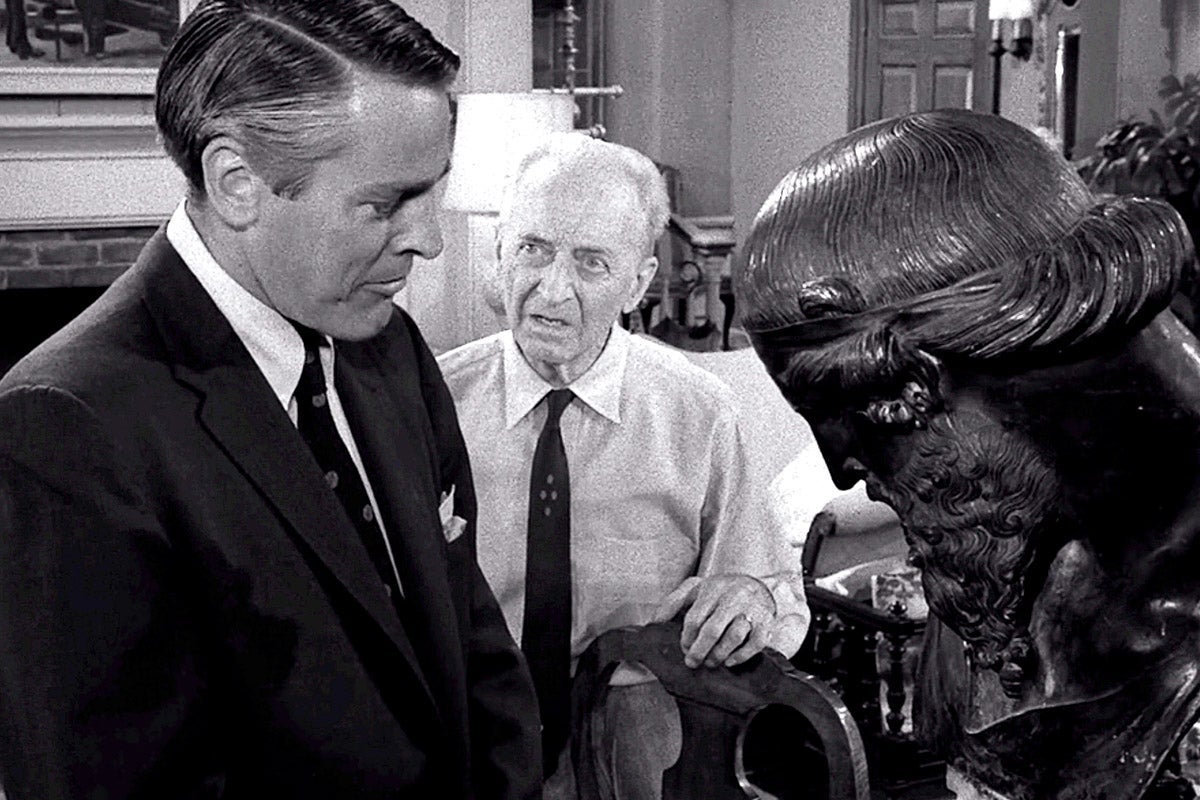
Kevin McCarthy and Edgar Stehli in The Twilight Zone.
Photo illustration by Slate. Photo by CBS.
When it comes to The Twilight Zone, it’s hard for a newcomer to fully appreciate classic installments like “Nightmare at 20,000 Feet” or “Time Enough At Last” without feeling like they’ve seen it all before. The twists from these episodes have been television staples for so long now that they’re not so much iconic as they are idiomatic: Witness how everyone from Stephen King to political columnists to ordinary civilians has compared Trump’s capricious White House firings to a telekinetic child tyrant “wishing” his terrified plenary subjects “into the cornfield,” a reference to a Twilight Zone episode that premiered 58 years ago this past November. Whether first encountered in reruns, New Year’s Eve marathons, remakes, or parodies, highlights from the famous anthology TV series are too permanently ensconced in the American imagination to provide the fresh sense of dread that any good introduction to The Twilight Zone ought to deliver.
That’s why a viewer’s first foray into Rod Serling’s fifth dimension should begin with one of the series’ equally eerie but underrated masterpieces. And you can’t do much better than the supernatural chamber piece “Long Live Walter Jameson,” an entry from the back half of the show’s first season that still manages to feel resonant today in the #MeToo era. Walter Jameson is a college history professor with a knack for making his subjects come alive in the lecture hall. The secret to his pedagogical success, as his colleague and soon-to-be father-in-law Samuel Kittridge is shocked to discover, is that Jameson has lived through most of the history he teaches over the past 2,500-some-odd years of a perversely immortal life.
Professor Kittridge, who hopes that his daughter Susanna will soon finish her own Ph.D., is horrified that Jameson plans to make Susanna the next in his many centuries of temporary housewives. Predictably, the professor has some trouble convincing his daughter that she’s caught in a supernatural May-December relationship with a man whose birth predates the invention of the western calendar system.
The episode was written by Charles Beaumont, one of the notable science fiction and horror writers to have contributed to The Twilight Zone, who is maybe best remembered for having written the classic episode “The Howling Man.” (His imprimatur on the show’s sensibility was strong enough that some of his short stories were later adapted into episodes of the doomed 1980s revival series.) Like many #MeToo stories, “Long Live Walter Jameson” is, as Serling describes it in his opening narration, “a nightmare, one not restricted to witching hours of dark, rainswept nights.” Thanks to an unknown alchemist from back in Europe’s Iron Age, Walter Jameson has lived over two millennia as a perfectly debonair silver fox, forever on the cusp of middle age.
In that time, he’s become a serial predator whose most pernicious criminal act has been to convince youthful victims that he too is a mere mortal, ultimately to deceive them into devoting the best years of their lives to him, then leaving them before they learn the truth of his immortality. One of the script’s smartest narrative dodges is that Jameson seems to barely remember, much less care about, the details of how he came to be immortal, nor has he kept track of the wives and children he’s abandoned. He moves compulsively forward through time, a self-described coward too self-involved and ravenous to admit what he really is: a monster.
“Long Live Walter Jameson” deserves credit for expertly conveying the occult menace of grooming as a prelude to sexual abuse and manipulation in age-inappropriate relationships — well over a decade before “grooming” became an established concept in the criminal psychology literature and a full 16 years before Anne Rice published Interview with the Vampire. What elevates the episode from merely being a good take on a classic “be careful what you wish for” premise is both Beaumont’s layered script and Kevin McCarthy’s commanding performance as Jameson.
McCarthy approaches the character with a level of charisma and self-assuredness that makes his Jameson so convincing you have to keep reminding yourself how a craven and manipulative he really is. (McCarthy, incidentally, is probably best known for playing Dr. Miles Bennell in the original 1956 Invasion of the Body Snatchers, and it’s fun to see him here playing against that role: The gaslighted doctor, racing into oncoming traffic with dire warnings about alien doppelgängers, returns as the gaslighter.) Jameson’s final lie might not register as the most horrifying moment of the story’s climax upon first viewing, but it will stay with you as an act of self-delusion so grandiose and believable that its creepiness lingers on far after the supernatural scares have worn off.
A nontrivial flaw in the plot’s construction is that Susanna Kittridge is not given especially active role in the otherworldly drama unfolding around her, but the third-act twist in “Long Live Walter Jameson”—which I won’t spoil here—helps balance out that moderately regressive feature. Viewers who feel overwhelmed by the ceaseless news of real-world men behaving badly might prefer to start with one of the other equally underappreciated deep cuts from The Twilight Zone’s 156-episode run. Season 5’s “The Old Man in the Cave,” a post-apocalyptic morality play with a magnetic performance by James Coburn, would be an excellent swap, and the show still has some unsung prescient bits of science fiction, like automation farce “The Brain Center at Whipple’s.”
Still, few episodes are so criminally underappreciated and make such a persuasive case for the Twilight Zone’s enduring relevance as “Long Live Walter Jameson.” Kittridge, briefly overtaken by the prospect of learning the secret to immortality for himself, nicely sums up the truly scary (and slightly embarrassing) truth at the center of the episode. “I thought, if a man lived forever, he’d grow wiser,” Kittridge says, “but that isn’t true, is it?”
Available to stream on Hulu.
from Slate Magazine https://ift.tt/37hxgdc
via IFTTT
沒有留言:
張貼留言